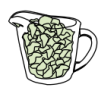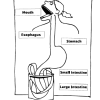Search Results
Showing results 1 to 13 of 13

Serving Sizes
Source Institutions
In this nutrition and estimation activity (page 12 of PDF), learners estimate serving sizes of different foods and compare their estimates to serving size information provided on nutrition food labels

Compare Dinosaur Body Parts
Source Institutions
In this activity, learners explore the size and scale of dinosaurs. Learners listen to "The Littlest Dinosaurs" by Bernard Most to learn about the different sizes of dinosaurs.

Pea Brain!: Explorations in Estimation
Source Institutions
In this activity, learners use two different techniques to estimate how many little things fit into one bigger thing.

Food for the Brain
Source Institutions
In this activity, learners dissect a piece of pizza to learn about nutrients important for health.

Building Blocks
Source Institutions
In this activity (page 32 of PDF), learners investigate the nutritional needs of healthy bones and muscles.

Sketch a Skeleton
Source Institutions
In this activity (on pages 15-18 of PDF), learners make a life-size two-dimensional paper model of their own skeletons.

Shark Sizes
Source Institutions
In this graphing exercise (page 2 of the pdf), learners compare their own height to the length of various sharks.

Inside Out
Source Institutions
Learners draw and cut out shapes of organs from construction paper. Then they attach these organs to the body of one learner to make a life-sized map of all the internal organs.

Servings and Choices
Source Institutions
In this nutrition activity (page 16 of PDF), learners document their individual eating habits and learn whether their eating patterns meet their needs.

Mapping the Homunculus
Source Institutions
In this activity, learners will explore how the human brain interprets environmental stimuli.

Traveling Tapeworm
Source Institutions
In this "gross" activity (on pages 34-46), learners make a life-size model of a human digestive tract, and follow the life of a beef tapeworm as it makes its way through.

Energy Sources
Source Institutions
In this activity about the relationship between food and energy (page 5 of PDF), learners conduct an experiment to compare how much energy is released as heat from two different foods.

